3D Technologies
Practical 3D Technologies
The practical 3D Technologies program at San Antonio College offers classes and collaboration using advanced 3D content development tools and techniques and is funded through a federal HSI STEM grant. Our classes are open to the public and cover 3D visualization, modeling, sculpting, terraining, scanning, and printing. Our collaborations are open to STEM faculty, staff, students, schools, research institutions, along with federal, state, and local agencies.
Tenaces is a $3.8 million U.S. Department of Education-funded grant project of San Antonio College. This web page focuses on the Practical 3D Design, Visualization and Fabrication component of the grant.
Due to recent advances in technology, 3D design, scanning and printing tools are making their way into traditional industries and careers. Archaeologists around the world 3D scan ancient landmarks and historical artifacts for posterity. Police departments capture 3D crime scene records for high-profile investigations. Hospitals digitally sculpt and print realistic facial prostheses for patients with traumatic injuries. Unfortunately, none of these novel applications are addressed by existing 3D coursework in Texas or elsewhere in the U.S.
Common course offerings for the state of Texas do not acknowledge the growing influence of 3D or anticipate the impact these technologies will have on the global marketplace. While some architecture, engineering, film, or gaming classes incorporate related skills, each is locked within its own silo; sculpting is for games, CAD is for engineering, etc. We want to change this state of affairs in Texas.
Since 2012, San Antonio College has used 3D technologies to support Biology, Geology, Astronomy, and Chemistry classroom instruction; to assist the National Cave and Karst Research Institute in resolving speleological research questions; and to scan and catalog over 200 sauropod and theropod dinosaur footprints discovered in Bexar County for the Texas Parks and Wildlife Department.
In addition to these activities and more, SAC staff members have presented 3D scanning, sculpting, and printing technologies to mortuary science students and faculty since 2014. The mortuary science department at SAC, which has long used industry-standard oil-based clay in its restorative arts classes, has recently purchased two 3D scanners and two 3D printers to add these new technologies to its curriculum.
The Practical 3D Design, Visualization and Fabrication program builds on San Antonio College’s use of groundbreaking technologies in education and research by introducing 3D scanning, modeling, sculpting, visualization, and printing technology to students and professionals from a wide variety of disciplines and fields.
Through this project, in 2017, our team conducted Practical 3D professional development workshops hosted on the San Antonio College campus and at partnering institutions. This hands-on training included: 1) how to 3D scan people, places and things; 2) how to 3D sculpt plants, animals and other natural shapes; 3) how to 3D model buildings, tools and other mechanical objects; 4) how to parametrically design 3D landscapes and terrain features; 5) how to use 3D visualization and online distribution technologies; and 6) how to prepare, print, and fabricate 3D model prototypes and duplicates.
Input collected from these workshops was used to refine the development of month-long 3D mini-classes and lead to the formation of seasonal technology camps. These programs of study are now a regular feature of our department.
All of SAC’s Practical 3D classes and seasonal technology camps follow a “flipped” class format. Participants view lectures and instructional videos on the YouTube media platform, then download and complete activity files associated with each lesson. For our adult technology classes, students will also attend weekly Zoom telecommunication platform sessions to discuss the content of the lectures, instructions, activities, and any other related topics. All of our classes and camps are scheduled as short, month long, single-discipline focused offerings.
3D Visualization
The 3D Visualization class introduces students to multiple 3D technologies and familiarizes them with software that will be used in many of the other classes we teach. This is a starter class that covers the basics of adding objects in 3D, moving around in virtual spaces, animating simple scenes, setting up lighting, backdrops, surface/volumetric materials, and generating special effects. This class is for anyone who is curious about 3D and is unsure of which discipline to pursue.
3D Modeling & Design
The 3D Modeling & Design class focuses on the skills needed for making virtual objects from scratch using nothing but a mouse, a computer, and an idea. Students will learn how to use powerful software to make mechanical devices, structures, vehicles, tools, and other "manufactured" shapes. This class is best suited for product designers, students who are visual or spatial problem-solvers, or people who need to know how to repair problems in the 3D models of others.
3D Sculpting & Design
The 3D Sculpting & Design class teaches students how to create "organic" objects and natural shapes from scratch using a computer, a mouse, a digital drawing tablet, and an affinity for interesting forms. Students will learn the skills necessary to sculpt virtual clay into rocks, plants, animals, people, and even fantastical creatures. This class is best suited for students with a strong sense of spatial drama and a fascination with life-like designs.
3D Terraining & Virtual Worldbuilding
The 3D Terraining & Virtual Worldbuilding class introduces students to various methods of creating digital landscapes using parametric software tools. Students will learn how to create mountains, valleys, plateaus, volcanoes, craters, asteroids, and more with easy-to-manipulate node-based "flow charts" to simulate natural geological phenomena like uplift, erosion, thermal weathering, etc. This class is best suited for students who wish to create virtual playgrounds, game terrain, or who need spatial landscape backdrops for their 3D art.
3D Scanning & Digital Metrology
The 3D Scanning & Digital Metrology class teaches students how to use powerful 3D scanning equipment to instantly capture the surface details of physical objects. It also gives students a chance to use common digital cameras, smart phones, and inexpensive software to collect the same geometric data in a different way. This class is great for students who make traditional art (clay sculptures, for example) and need to digitally duplicate their work or for those who want to generate spatial portraits of people or make virtual recreations of physical spaces or artifacts.
3D Printing & Fabrication
Our 3D Printing & Fabrication class is focused on teaching students how to prepare, print, and clean up existing digital objects (many of which can be downloaded from the Internet). Students in this class are encouraged to bring their own designs to class, but purchased and public-domain models/sculptures can be printed as well. Students also learn how to mold and cast duplicates of printed prototypes into finished pieces using silicone, resin, and plaster. This is great for people who like seeing how things are made and aren't afraid to get their hands dirty.
SAC 3D technology Summer and Winter camps offer technology training to children (aged 13-17) during mid- and end-of-year breaks. These camps cover 3D visualization, modeling, sculpting, terraining, scanning, printing, and fabrication.
Off-schedule classes and events can be arranged with enough student interest.
Seasonal technology camps coincide with Summer and Winter school breaks and will be announced soon.
For more information, please contact our Academic Program Coordinator, Aaron Ellis.
Phone: (210) 486-1223
Emial: aellis43@alamo.edu
Our team produces a 3D technologies newsletter that discusses related disciplines, highlights recent projects, covers noteworthy news items, teaches techniques, and offers inspiration. FACET originated as a print publication, but has transitioned to an online, PDF format due to the COVID-19 pandemic.
Clickable links to our online issues can be found below and may be read within most Internet web browsers and can be downloaded for later perusal.
January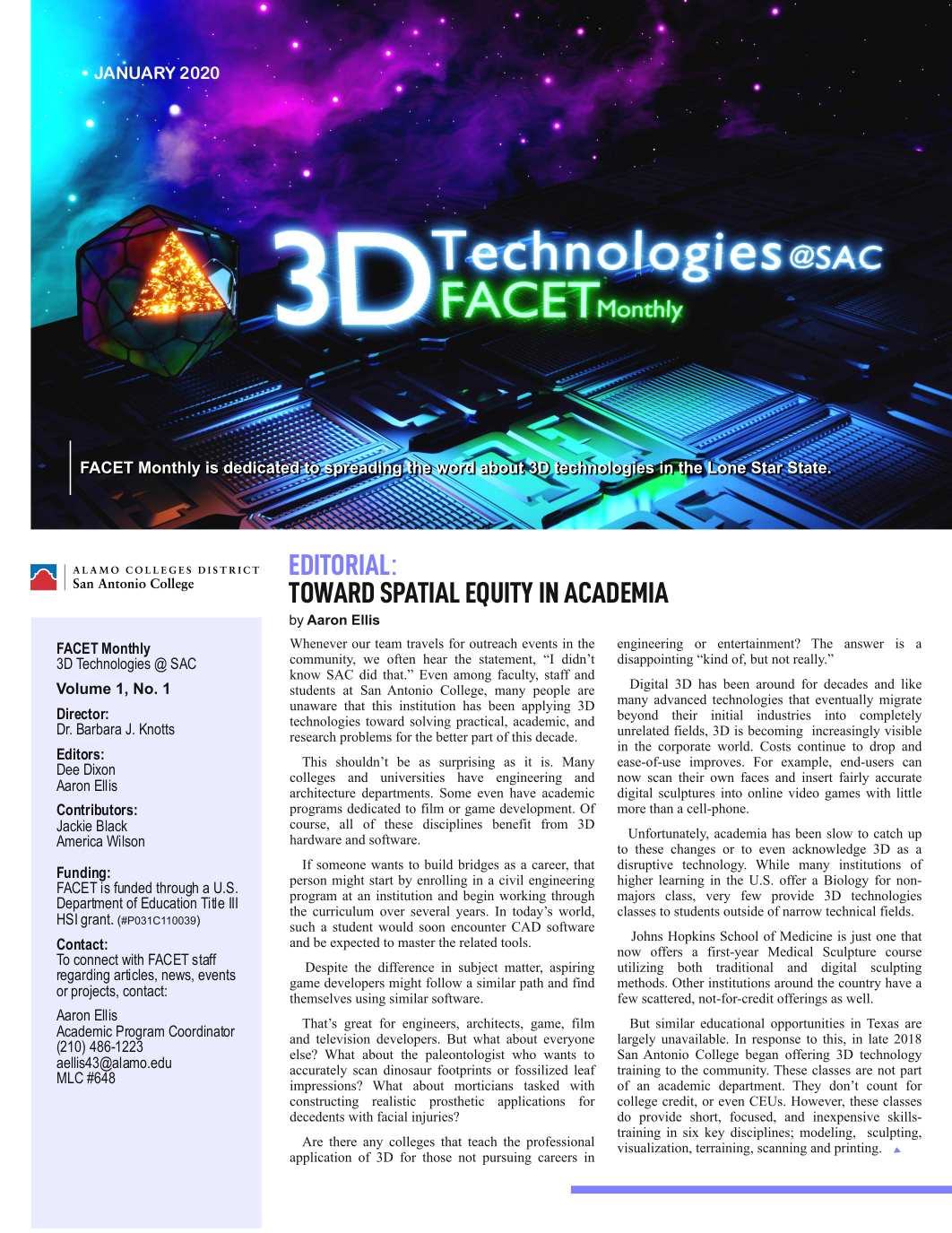 |
February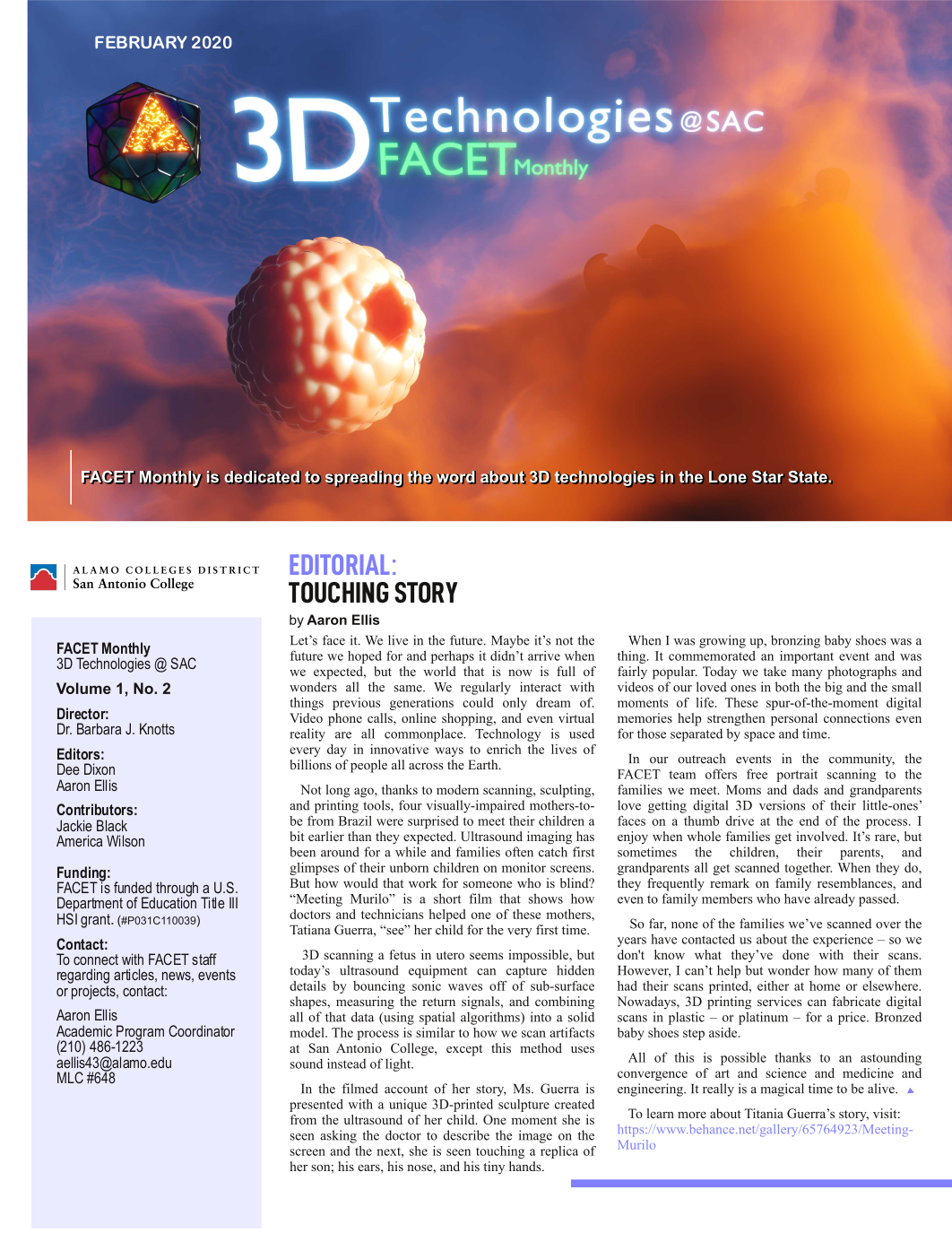 |
March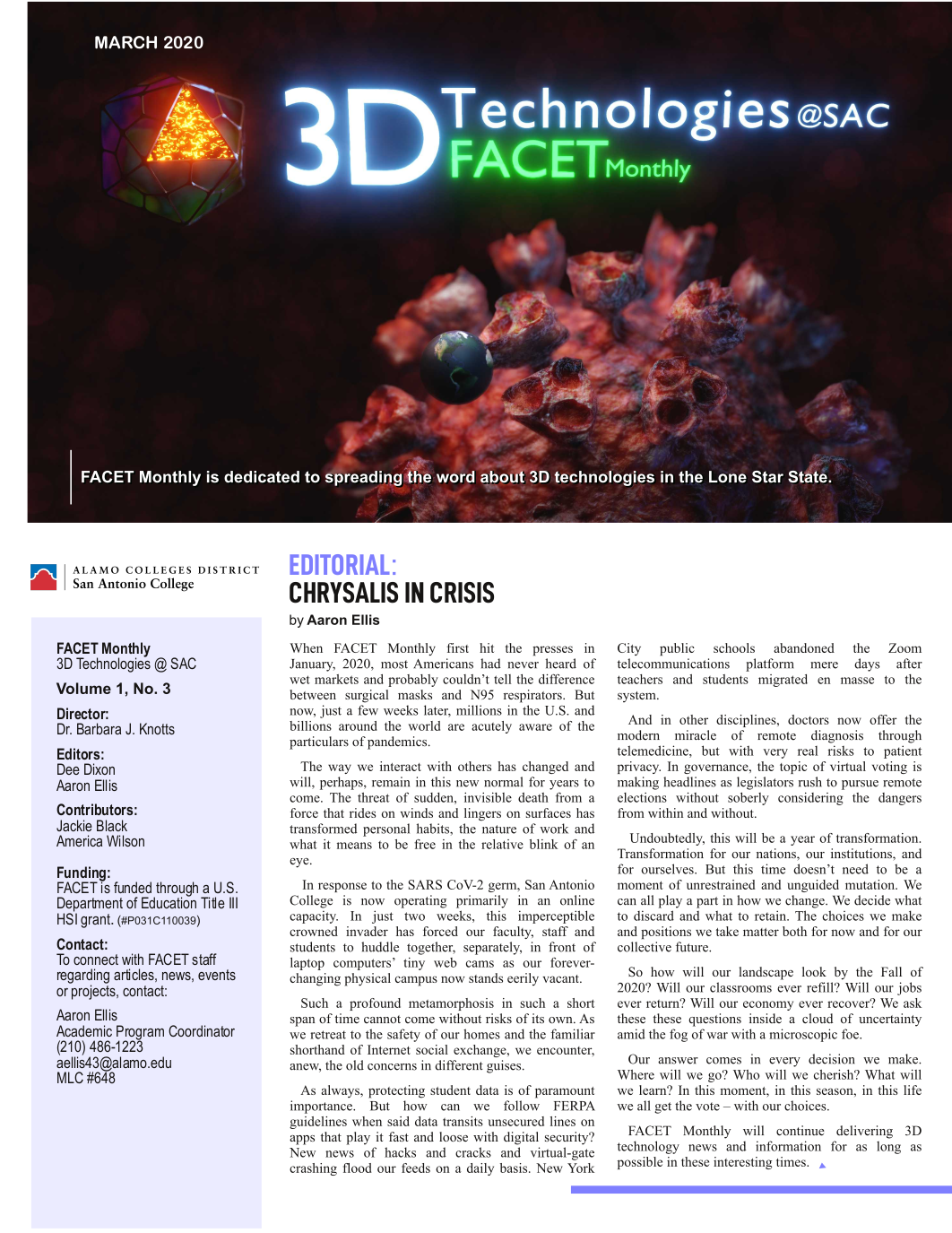 |
April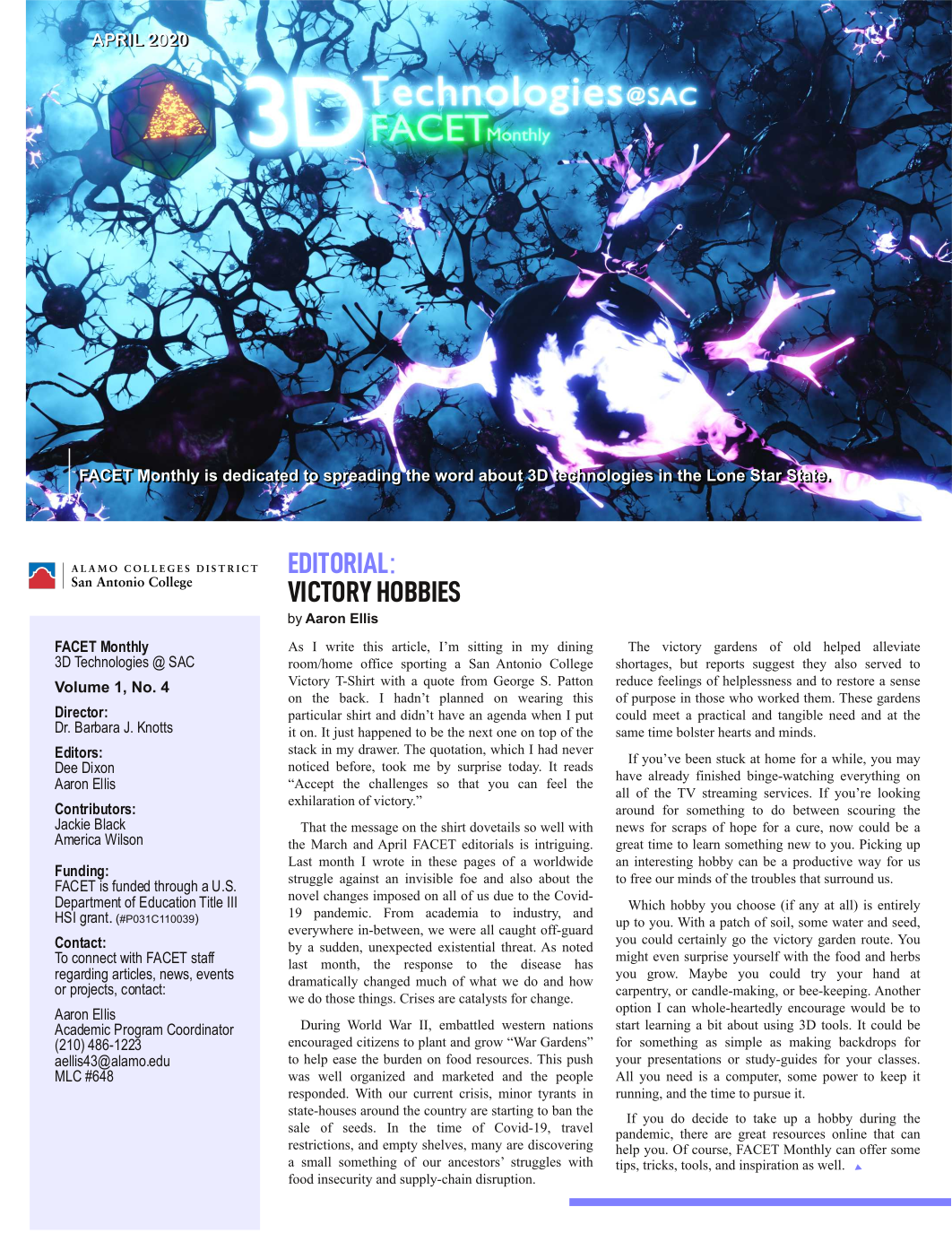 |
May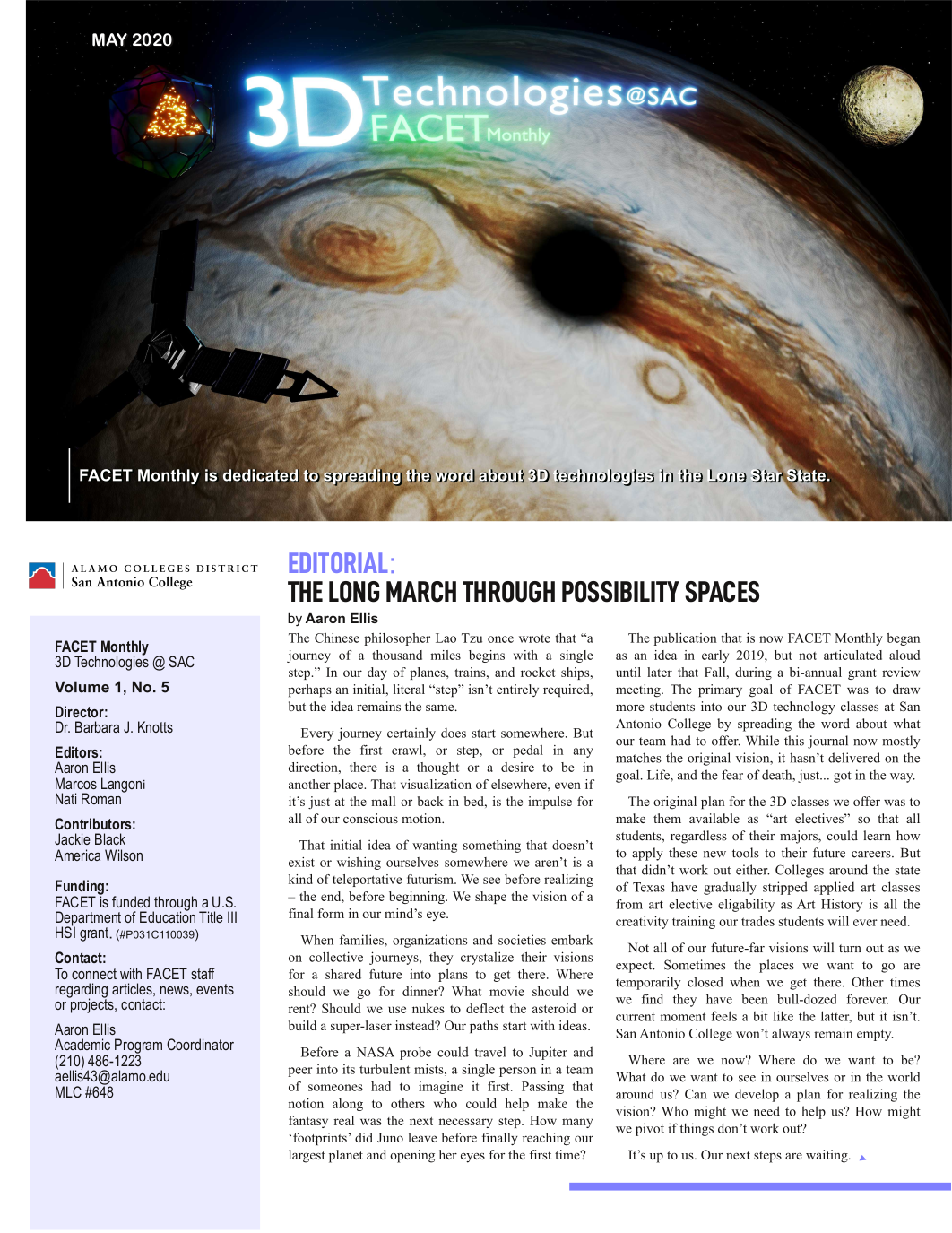 |
June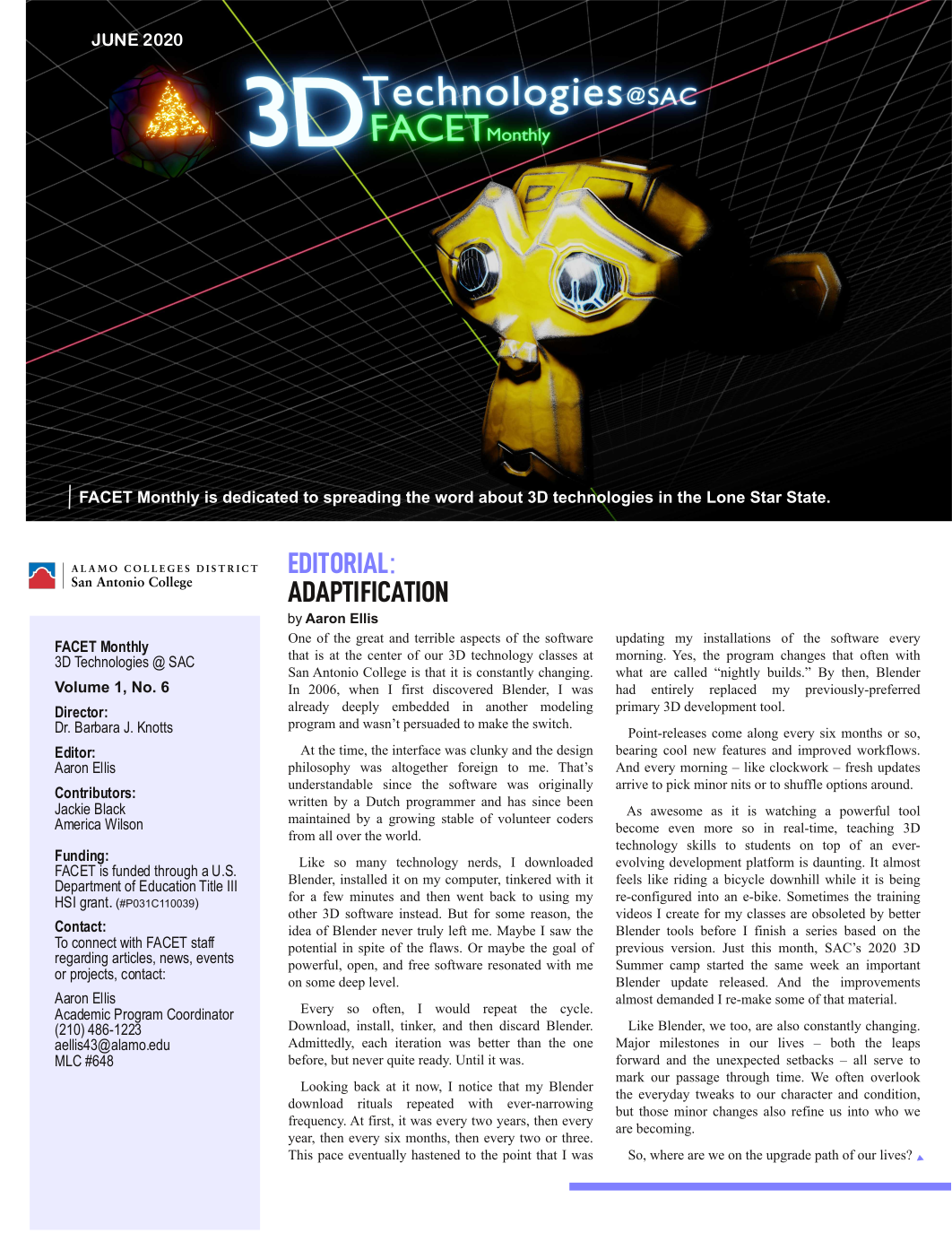 |
Contact Information
To learn more about 3D Technologies training at San Antonio College, to register for classes/camps, to discuss collaboration opportunities, or to request 3D technology presentations for members of your organization, please contact
Aaron Ellis
Academic Program Coordinator
Title III - Tenaces
aellis43@alamo.edu
3D Technologies Gallery

